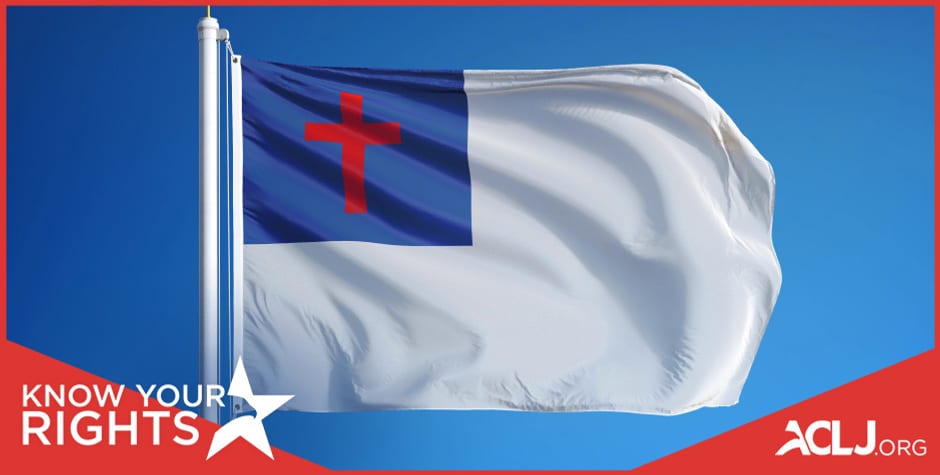Know Your Rights: The Government Can't Censor Christian Speech
Religious free speech has often been restricted or suffered attempts made to restrict it, particularly with the pretense or misunderstanding that a government may not permit use of its publicly available billboards or other public areas because to do so would be to establish a state religion. We have prepared a legal memo explaining this complex area of law.
The constitutional prohibition on establishing an official religion is in the First Amendment and reads: “Congress shall make no law respecting an establishment of religion, or prohibiting the free exercise thereof; or abridging the freedom of speech . . . .” U.S. Const. Amend. 1 (The italicized words are called the “Establishment Clause.”)
A good example, from 2018, of misunderstanding religious free speech and its relation to the Establishment Clause was the ReaderBoard of Grand Rapids, Michigan, where the ACLJ intervened to protect a local Christian organization’s free speech rights. The City of Grand Rapids had a ReaderBoard available to its citizens in order to publicize upcoming community events. Our client contacted the city in order to post about an upcoming concert which rejected the post because of its religious content. The city had a policy prohibiting any religious content on the ReaderBoard. It apparently believed that the Constitution required such a prohibition by government entities. However, this is not what the Constitution requires or permits. We pointed this out in a legal demand letter and the city permitted our client to post. (You can read the entire story in our blog here.)
Last year, the Supreme Court clarified that religious free speech is not the stepchild of free speech rights or a lesser right that must give way to the constitutional prohibition on the establishment of a religion. The Court has begun to give the religious speech the protection it is due by removing the last rationale for discriminating against it.
The Supreme Court did this in two cases. The first, Shurtleff v. City of Boston, 142 S. Ct. 1583 (2022), simply held, again, that the government may not suppress or exclude the speech of private parties for the sole reason that the speech is religious. In Shurtleff, the City of Boston denied a request to display a “Christian” flag on a flagpole, even though it had not previously denied any other request, out of concern that permitting such a display would violate the Establishment Clause. Id. at 1588. The Court found that a private party displaying its religious flag on a Boston’s flagpole would not violate the Establishment Clause, and so, viewpoint discrimination was not permitted.
This holding clarified and reiterated prior rulings that the “First Amendment forbids the government to regulate speech in ways that favor some viewpoints or ideas at the expense of others.” Lamb’s Chapel v. Ctr. Moriches Sch. Dist., 508 U.S. 384 (1993) (quoting City Council of Los Angeles v. Taxpayers for Vincent, 466 U.S. 789, 804 (1984)). (Of note, Lamb’s Chapel was a landmark Supreme Court case in this area argued and won by ACLJ Chief Counsel Jay Sekulow, one of many of these kinds of cases we have won.)
In the second case, Kennedy v. Bremerton Sch. Dist., 142 S. Ct. 2407 (2022), the School District had forbidden Coach Kennedy, their employee, to pray after school games. It provided a rationale that to permit the prayers would violate the Establishment Clause. The Supreme Court rejected the argument that the government has “a duty to ferret out and suppress religious observances even as it allows comparable secular speech. The Constitution neither mandates nor tolerates that kind of discrimination.” Id. at 2433.
Previously, religious speech had often been given second-class status in the name of avoiding an Establishment Clause violation. Now the Supreme Court has explicitly rejected both a second-class status for religious speech and a duty to ferret it out in government-controlled forums. Religious speech is protected to the same degree as all speech is.
The ACLJ is in the vanguard of the fight against these distortions of one of our most precious freedoms. ACLJ attorneys work constantly to ensure that the right to free speech remains secure even when the speech concerns currently disfavored viewpoints on subjects like religion and abortion. Learn more in our legal memo on this topic.
We are dedicated to defending your constitutional rights. We have been providing assistance and legal representation, at no cost or charge, to people just like you for decades. If your rights are being violated in this area, please contact us at ACLJ.org/HELP.
